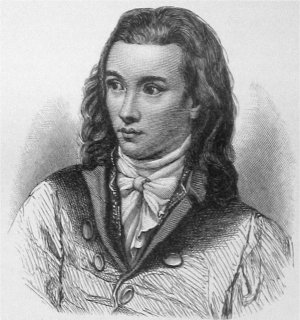Novalis Frases famosas
“Até mesmo o acaso não é impenetrável; tem suas próprias regras.”
Atribuídas
Fonte: Citações da Cultura Universal - Página 22, Alberto J. G. Villamarín, Editora AGE Ltda, 2002, ISBN 8574970891, 9788574970899
Citações de homens de Novalis
Citações de amor de Novalis
Novalis frases e citações
Wenn man einen Riesen sieht, so untersuche man erst den Stand der Sonne - und gebe acht, ob es nicht der Schatten eines Pygmäen ist.
Novalis schriften: th. Ueber das lehen Friedrichs von Hardenberg (signed: Just). Aus Novalis tagebuche seiner letzien lebeusjahre. Gedichte. Verstreute blätter. Briefe. Fragmente, Volume 3 - página 314 https://books.google.com.br/books?id=mao5AAAAMAAJ&pg=PA314, Novalis, Ludwig Tieck, Karl Eduard von Bülow - G. Reimer, 1846
“Na verdade, a filosofia é nostalgia, o desejo de se sentir em casa em qualquer lugar.”
Die Philosophie ist eigentlich Heimweh - Trieb überall zu Hause zu sein.
Das allgemeine Brouillon, Materialien zur Enzyklopädistik 1798/99, Nr. 857
“A mulher é um amável segredo, não hermético mas velado.”
Sie sind ein liebliches Geheimnis — nur verhüllt, nicht verschlossen.
Novalis Schriften: Apologie von Friedrich Schiller. Dialogen. Monologen. Predigtfragment. Die Christenheit oder Europa. Journale und Tagebücher. Fragmente - Volume 2 - Página 277, Novalis, Jacob Minor - Diederichs, 1907
Novalis: Frases em inglês
Pupils at Sais (1799)
Die Möglichkeit aller Philosophie ... dass sich die Intelligenz durch Selbstberührung eine Selbstgesezmäßige Bewegung - d.i. eine eigne Form der Tätigkeit gibt.
Schriften, p. 63, as translated in Walter Benjamin: Selected Writings: Volume 1, 1913-1926 (1996), p. 133
Metaphysics, again, is the Dynamics of Thought; treats of the primary Powers of Thought; occupies itself with the mere Soul of the Science of Thinking. Metaphysical ideas stand related to one another, like thoughts without words. Men often wondered at the stubborn Incompletibility of these two Sciences; each followed its own business by itself; there was a want everywhere, nothing would suit rightly with either. From the very first, attempts were made to unite them, as everything about them indicated relationship; but every attempt failed; the one or the other Science still suffered in these attempts, and lost its essential character. We had to abide by metaphysical Logic, and logical Metaphysic, but neither of them was as it should be.
Pupils at Sais (1799)
“Someone arrived there — who lifted the veil of the goddess, at Sais.”
But what did he see? He saw — wonder of wonders — himself.
Novalis here alludes to Plutarch's account of the shrine of the goddess Minerva, identified with Isis, at Sais, which he reports had the inscription "I am all that hath been, and is, and shall be; and my veil no mortal has hitherto raised."
Pupils at Sais (1799)
The highest statement of cognition must be an expression of that fact which is the means and ground for all cognition, namely, the goal of the I.
Fichte Studies § 556
